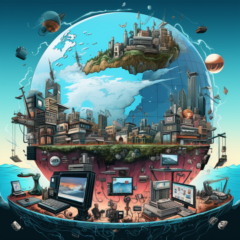
In an era marked by rapid technological advancements and unpredictable market shifts, the concept of learning agility has emerged as a cornerstone for personal and organizational success. This concept goes beyond traditional skill sets, embracing a mindset that is adaptable, flexible, and open to continuous learning.
The Shift from Predictability to Volatility
Traditionally, career paths were more predictable. People often learned a profession and remained in the same job for life, where qualities like reliability and precision were highly valued. However, the onset of the 21st century has ushered in a VUCA world – characterized by Volatility, Uncertainty, Complexity, and Ambiguity. This new landscape demands a different set of skills for success, especially in modern companies.
The Evolution of Corporate Learning
Businesses initially tackled this shift by implementing classroom training and leadership development programs. However, these methods soon proved inadequate in keeping pace with the rapid changes. This led to the adoption of the 70:20:10 model for learning and development, which emphasizes experiential learning (70%), learning through others (20%), and formal educational events (10%). Today, learning agility has become a critical dimension in assessing an individual’s potential for growth within an organization.
The Stark Reminder from Digital Disruption
A quintessential example of the necessity for learning agility can be seen in the rise and fall of Blockbuster. Once a dominant force in the video rental industry, Blockbuster’s failure to adapt to the shifting market dynamics – epitomized by the rise of Netflix and its innovative online, subscription-based model – led to its downfall. Blockbuster’s rigid mindset, its inability to pivot in the face of change, and the missed opportunity to acquire Netflix serve as a stark reminder of the consequences of resisting a growth mindset.
Why Learning Agility Matters
The story of Blockbuster and Netflix is not just a tale of business strategy but a lesson in cultural adaptation and the importance of learning agility. In today’s rapidly changing world, the ability to learn from new experiences, to experiment, and to apply these learnings to new, unforeseen challenges is not just an asset but a necessity.
The Way Forward
The challenge for both individuals and organizations lies in developing a growth mindset, one that is rooted in the belief that abilities can be developed through dedication and hard work. This mindset fosters a culture of learning, curiosity, and resilience, equipping us to thrive in an ever-evolving world.
In conclusion, learning agility is no longer just a desirable trait but a critical component for success in today’s VUCA world. Whether we look at individual careers or organizational strategies, the ability to adapt, learn, and grow is what will define the leaders of tomorrow. Let’s embrace this change, not with apprehension, but with the excitement and eagerness of learners ready to conquer the next challenge.
